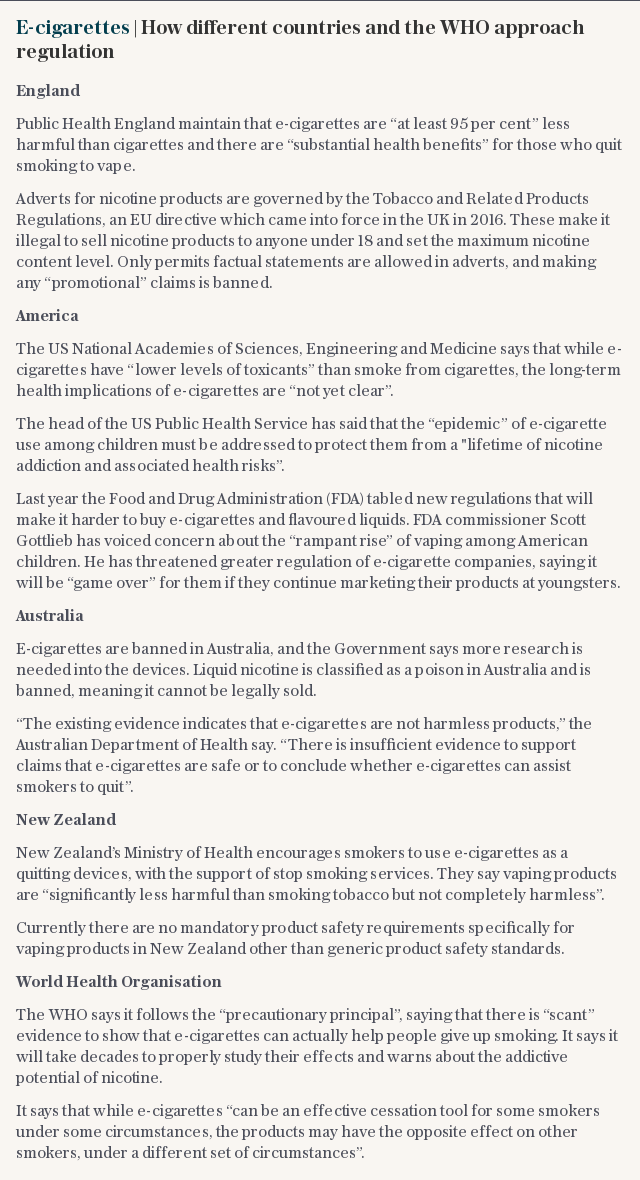'Vape at your peril', doctors warn as they reveal teenage boy contracted life threatening condition

People should regard e-cigarettes as safer than tobacco at their "peril", NHS doctors have said, after treating a teenage vaper who almost died from “catastrophic” respiratory failure.
Ewan Fisher was put on life support aged just 16 after suffering from an allergic inflammatory reaction which could have cost his life.
The teenager was rushed to the Accident & Emergency department of Nottingham University Hospitals NHS Trust after becoming seriously unwell.
He was treated for hypersensitivity pneumonitis – a type of allergic reaction which results in inflammation of the lung tissue.
The young man became so ill that he was put on a type of life support in which an exterior artificial lung puts oxygen into the blood and pumps it around the body.
Writing in the journal Archives Of Disease In Childhood, doctors said the "previously well young person presented with a catastrophic respiratory illness" which put his life in danger.
They said the trigger was likely to have been an immune response to a chemical in e-cigarette fluid, calling for far more caution over the use of e-cigarettes.
Mr Fisher, who turns 19 today, urged others to stay away from vaping, warning that his illness - which took 14 months to recover from - had almost killed him.
Scientists are becoming increasingly divided over whether vaping is safe.
While evidence continues to be published on risks associated with vaping, Public Health England (PHE) stands by its claim that vaping is 95 per cent less harmful than smoking.
It says non-smokers should not try vaping, but smokers would be far healthier if they made the switch to e-cigarettes.
In the new case report, doctors told how their patient, then 16, was admitted to hospital following a week of fever, persistent cough, and increasing difficulty with breathing.
The teenager’s condition deteriorated rapidly, and he developed respiratory failure, and was given support from an artificial lung plus intravenous antibiotics and steroids.
Ten days later his condition became critical, and he developed severe muscle weakness, requiring a long period of rehabilitation.

The teenager revealed "that he had recently started to use e-cigarettes fairly frequently, using two different liquids, purchased over the counter", doctors wrote.
The listed ingredients for both vaping liquids were the same apart from the unnamed flavourings.
After two months, medics tested his skin reaction with a tiny amount of vaping fluid, and found it made his symptoms worse.
Blood samples also showed that he had antibodies in response to the liquids.
After 14 months, the teenager eventually recovered.
The doctors said: "Flavoured e-cigarettes liquids contain airway irritants and toxicants such as propylene glycol, vegetable glycerine and many different flavouring chemicals that have been implicated in the pathogenesis and worsening of lung diseases and that likely induce respiratory effects not seen in tobacco smokers."
They added: "There are two important lessons here. The first is always to consider a reaction to e-cigarettes in someone presenting with an atypical respiratory illness. The second is that we consider e-cigarettes as 'much safer than tobacco' at our peril."
Ewan Fisher, from Arnold, in Nottingham began vaping four or five months before he was admitted to hospital, having previously smoked.
"I switched to vaping because I thought it would be healthier and I was really into my boxing at the time so wanted to feel fit,” he said.
But he began suffering breathing problems, which saw him end up in intensive care.
"In the run-up to going to hospital, I had a choking cough and I was struggling to breathe,” he said.
"I ended up in intensive care and needed two forms of life support. I almost died.”
Mr Fisher said his health was still affected by the condition, which had left him suffering from anxiety, and meant he missed his GSCEs.
He said: "To people that already smoke, I'd say go to the doctor's for help, don't just switch to vaping.
"And to all the teenagers that vape and think it's something good, it's really not.
"I wouldn't wish this upon anyone, it ruins you and your family, and it affects your mental health.”
Dr Nick Hopkinson, British Lung Foundation medical director and reader in respiratory medicine at Imperial College London, said the findings showed it was "possible the patient's illness could have been due to an allergic response to a component of e-cigarette vapour".
However, he said it can often be difficult to make an accurate diagnosis for this condition.
"In Britain, 3.6 million people vape and youth use remains low," he added. "If this was a common problem or a significant risk we would expect many more cases.
"Advice remains that smoking carries a huge health risk and smokers need to quit if at all possible."
Professor John Britton, director of the UK Centre for Tobacco and Alcohol Studies, said: "It's not absolutely clear what has happened here, but it looks like an allergy to an inhaled substance.
"There have been a very small number of cases of this condition reported in vapers worldwide, so I think we can conclude that it happens but is thankfully very rare.
"This is worrying, and the risk needs to be acknowledged, but in absolute terms it is extremely small - and, crucially, far smaller than that of smoking."
Officials at Public Health England have thrown their weight behind vaping, last year urging NHS hospitals to start selling e-cigarettes and letting patients vape indoors - and even in bed.


But before standing down as Chief Medical Officer, Prof Dame Sally Davies recently expressed concern that vaping is a “a ticking time bomb” which could do long-term harm.
Yesterday the American Heart Association raised concerns about the safety of vaping, after studies found higher levels of “bad cholesterol” and lower levels of blood flow, among those using e-cigarettes.
Last week a study by the University of Kansas suggested using e-cigarettes could raise the risk of heart attacks by a third.

